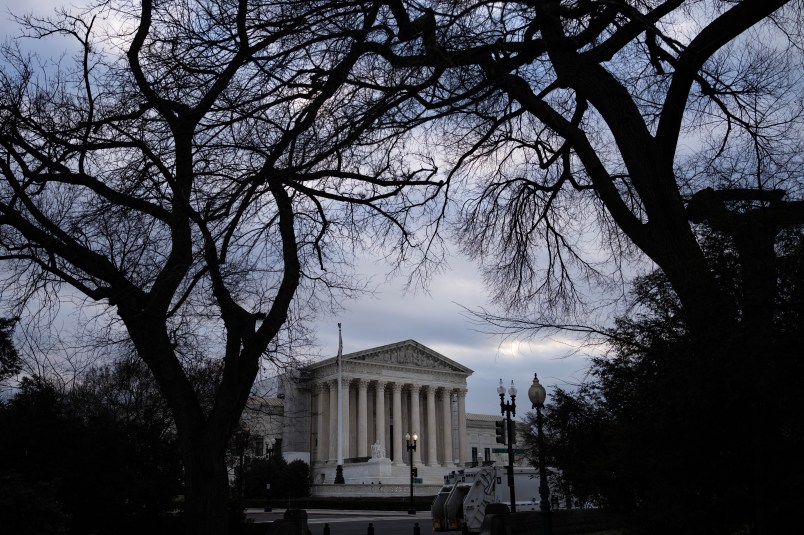The 5th Circuit Court of Appeals dealt a blow to the Biden administration’s attempts to shore up emergency abortion care Tuesday.
The judges, exhibiting some of the legal contortions that have become standard issue for the notoriously right-wing court, ruled that a federal mandate that requires many hospitals to stabilize patients in crisis does not include abortions — even when an abortion is that stabilizing care the patient needs.
The Supreme Court will almost certainly get involved at some point, while this issue percolates at two different appellate courts.
The case stems from guidance issued by President Joe Biden’s Department of Health and Human Services shortly after the Dobbs decision, when the administration reminded hospitals of their obligation to stabilize patients, even in states with anti-abortion regimes. Texas argued that that guidance, which the government insists is simply a reminder of what the underlying statute already required, was something new, far beyond the scope of the law.
The 5th Circuit panel, composed of two Donald Trump appointees and one George W. Bush, proved amenable to that argument.
While that underlying mandate that hospitals receiving Medicare funds stabilize patients — the Emergency Medical Treatment and Active Labor Act (EMTALA) — doesn’t specify much about particular kinds of medical care providers can and should give patients in life-threatening distress, the court found its silence on abortion oddly compelling.
“A plain reading shows that Congress did not explicitly address whether physicians must provide abortions when they believe it is the necessary stabilizing treatment to assure that no material deterioration of the condition is likely to result of an individual’s emergency medical condition,” they wrote.
EMTALA also doesn’t instruct physicians to remove a screwdriver from someone’s eye, or to perform an appendectomy when a patient’s appendix is dangerously inflamed; it’s a broad writ of authority telling doctors that they must do what is necessary to stabilize the patient and transfer them to another facility if necessary.
The judges latched on to what they call a “dual requirement” to give life-saving care to both the patient and fetus; the government counters that the requirements in EMTALA related to pregnant people are just about safely transferring those patients.
“The question before the court is whether EMTALA, according to HHS’ Guidance, mandates physicians to provide abortions when that is the necessary stabilizing treatment for an emergency medical condition,” the judges conclude. “It does not.”
So EMTALA’s virtual silence on abortion, its sole mandate to provide whatever life-stabilizing care physicians deem necessary, has become a carving out of abortion from the doctors’ aresnal. Physicians in Texas would have to risk the myriad punishments the state has threatened to perform an abortion amid an ill-defined “medical emergency,” which the recent high-profile case of Texan Kate Cox in particular has shown to be all but impossible to prove in court.
It’s further evidence of what’s always been true, and what Texas specifically has been so zealous in displaying: The anti-abortion movement was never about ending so-called “elective” abortions, but carefully siloing off those necessary to avoid women’s illness or death. Anti-abortion regimes cannot and do not try to meaningfully distinguish between the two.
Over in Idaho, the Biden administration has pressed the EMTALA issue proactively, arguing that that state’s ban — which has even narrower exceptions than Texas’ — runs afoul of EMTALA’s stabilization requirement. There, the administration has had much more success: a win at the district court and a fairly short-lived defeat at the 9th Circuit. Three 9th Circuit Trump appointees stayed the lower court ruling, which would have let Idaho reimpose its abortion ban in emergency situations while the case proceeds. But the full 9th Circuit has taken up the case; it quickly moved to vacate the panel’s stay ruling, letting the district court decision stand, and rejected Idaho’s request to again reimpose its ban in all situations for the duration.
What happened next gives us clues to how this case may ultimately play out, as between the Texas and Idaho cases — particularly if the 9th Circuit comes down differently than the 5th did — it’s almost certain to reach the Supreme Court at some point.
Stymied by the 9th Circuit, Idaho went to the Supreme Court on Nov. 20, asking the justices to grant its emergency request for a stay so the ban remains in place during the appeal process.
And that’s it. The Court has not responded to that application for well over a month now, suggesting that the right wing of the bench may not have the five votes necessary to grant it. It’s a small tea leaf, but likely a hopeful one for the Biden administration.
The 5th Circuit’s ruling, then, will not be the final word on emergency abortion care. Like cases related to abortion medication, fetal anomalies and children who have been sexually assaulted, it’s just another active front in the post-Dobbs abortion wars.
Read the 5th Circuit’s ruling here:







These people are truly sick.
Abortion: Religious objection from tax-free churches.
Gay marriage: Religious objection from tax-free churches.
Education: Religious objection from tax-free churches.
School integration: Religious objection from tax-free churches.
Trans rights: Religious objection from tax-free churches.
Equality of representation: Religious objection from tax-free churches.
‘Church’ is rent-a-mob for the minority rich.
They better sue while there’s time, because if SCOTUS rules for Texas…
If DOJ wasn’t completely MAGAT it could bring criminal charges against the hospital administrators. Especially the one in Texas.